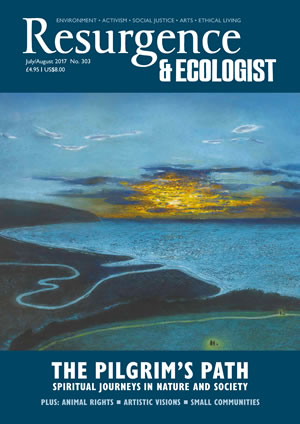To be a collector of rare species takes a mix of perseverance, judgement – knowing where to search – and a sense of awe to inspire you to keep at it. It is a lifetime commitment. In his new book, John Thackara puts his collection on display, and it is a rare commodity he has focused on – hope in an era of challenge and change.
The book follows his travels through the different contexts that might make up the next economy – from clothing and feeding to dwelling and water keeping. Thackara, director of the agency Doors of Perception, has been described by Business Week as “one of the great voices on sustainability”, and here he is on song.
His hope is not a shallow one. It starts with a clear-sighted acceptance of the challenges facing Nature and humanity. “Paved surfaces and pervasive media” shield us from a direct experience of the damage we are inflicting on soils, oceans and forests. The ecological catastrophe is not to come; it is already with us.
Soil is a microcosm of Nature. One tablespoon of soil contains around 50 billion microbes, more living things than all the human beings ever born. But we are losing this richness – 3.4 tonnes of healthy soil lost each year for every person on the planet. In the UK, after years of industrial agriculture, Thackara warns, we have perhaps only one hundred harvests left in the farm soil.
Using such focusing, Thackara can then caution and qualify some of the hopes that tend to be presented in the name of a more shallow greening of the economy. It takes fossil fuel energy, for example, to install renewable energy systems: there is 200km of copper in one wind turbine, for example, meaning that “there would be far fewer wind turbines if they had to be manufactured, installed, and maintained using wind energy.”
Green travel, an alternative to mass tourism, is welcome, but is “a tiny speck in the bigger picture” of grotesque exploitation. “If I were to pay $1,200 for a week-long trek in Morocco’s Atlas mountains, just $50 would go to the cook and the mule driver who do the work,” he observes.
Looking for deeper solutions, Thackara embarks on a series of stories of new ways of relating to Nature and to people, reflected in a half-poetic, half-obscure vocabulary of hope, such as grounding (“from heal the soil, to think like a forest”), dwelling (“from depave the city, to pollinator pathways”) and commoning (“from social money, to the art of hosting”).
Along the way, he describes some of the examples of inspiration he has found. World Wide Opportunities on Organic Farms is attracting 100,000 new members a year, connecting helpers with 14,000 farms in over 50 countries. An online forum, Ravelry, launched in 2007, links up 4 million knitters, crocheters, weavers, spinners and dyers in a new “fibre community”. The Watershed Management Group in Arizona operates as a cooperative whose members take it in turns to upgrade houses for rainwater harvesting and sustainable water use. In Austria, India and Israel, e-bikes (battery-powered bicycles) are taking off in a shift to “low calorie” modes of transport.
How will all these come together? On this point, Thackara is elusive. “The positive feeds on the positive,” he suggests.
This book is not a manual for social change or community economic development – there are other books that are. John Thackara’s outstanding contribution is his great passion for the curious and the new, the hopeful signs that an economy based on stewardship might be emerging all around us.








